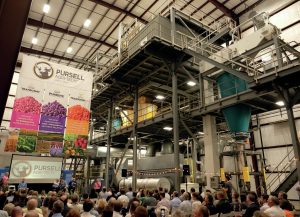
Sustainable fertilizer production
Pejman Djavdan , CEO of Stamicarbon looks at the ways in which the fertilizer industry must grapple with issues such as decarbonisation, sustainability and more efficient use of nutrients.

Pejman Djavdan , CEO of Stamicarbon looks at the ways in which the fertilizer industry must grapple with issues such as decarbonisation, sustainability and more efficient use of nutrients.
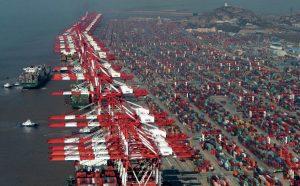
Johnson Matthey (JM) has signed an LCH™ technology licence with Equinor and Linde Engineering for H2H Saltend, one of the UK’s largest low carbon hydrogen projects. JM was selected alongside EPC partner Linde Engineering for the major FEED contract by Equinor. The licence counts towards JM’s milestone of winning more than ten additional large-scale projects by 2023/24.
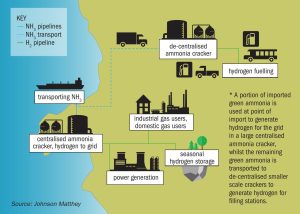
Advances in clean hydrogen and ammonia production is fuelling worldwide interest in a new market for hydrogen and ammonia to provide a reliable low-carbon energy future. Ammonia cracking, the dissociation of ammonia back into hydrogen, delivers a pathway to large-scale sustainable hydrogen production. In this article KBR, Johnson Matthey, thyssenkrupp Uhde, Duiker, Proton Ventures and Casale report on their technologies and approaches to ammonia cracking in a low carbon economy.
Mining, metals and fertilizer business intelligence company CRU has launched a new low-emissions ammonia (LEA) price assessment in its Fertilizer Week price reporting service. The price takes a value-based approach, whereby a premium on the Northwest European ammonia price is calculated on an emissions-mitigated basis, and leverages CRU’s proprietary nitrogen asset emissions data combined with weekly European carbon prices to calculate the value of emissions mitigated. CRU says that it has leveraged its Emissions Analysis Tool to develop the premiums on an emissions-mitigated basis as opposed to a cost basis, allowing end-users to assess how the switch to LEA can deliver value to their business while contributing to their decarbonisation strategies. The Emissions Analysis Tool is a comprehensive asset-byasset emissions dataset for the nitrogen industry.

Russia’s invasion of Ukraine has hit European fertilizer producers hard. Ammonia plants across the continent have been inactive over the winter due to prohibitively high feedstock costs. The future of nitrogen fertilizer production in the region will depend on access to an affordable, secure and sustainable energy supply and the switchover to low-carbon technologies.
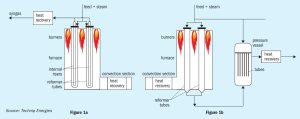
Previously, recuperative reforming has been mostly applied for capacity increase revamps, but nowadays it is a key enabler for efficient low carbon hydrogen and syngas production. Jan-Jaap Riegman of Technip Energies, Francesco Baratto of Casale and Stefan Gebert of Clariant discuss the benefits of recuperative reforming for reducing the carbon footprint of existing assets.

CRU’s Nitrogen + Syngas conference convened at the Hyatt Regency Barcelona Tower in Barcelona, from March 5th-8th.
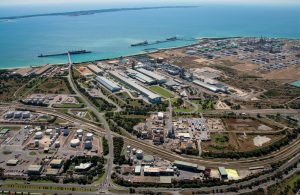
BASF says that its high-pressure regenerative CO2 capture technology HiPACT ® , codeveloped by BASF and engineering partner JGC Corporation will be used by INPEX, one of Japan’s largest exploration and production companies, in its Kashiwazaki Clean Hydrogen/Ammonia Project. This is Japan’s first demonstration project for the production of blue hydrogen/ammonia from domestically produced natural gas, the consistent implementation of carbon capture, utilisation and storage (CCUS) in domestic depleted gas fields and the use of hydrogen for power generation and ammonia production. The project is funded by the Japanese governmental organization New Energy and Industrial Technology Development Organization (NEDO).
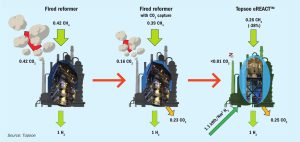
The world’s most common syngas production method remains steam methane reforming, a process which has a substantial CO2 footprint as the necessary reaction heat is supplied by combustion of hydrocarbons. Topsoe’s eREACT™ technology allows for the first-of-its-kind electrification of the traditional SMR process. The reaction heat for eREACT™ is instead generated directly by (renewable) electricity, thereby eliminating the flue gas altogether. Having gone through scale-up from bench scale to industrially relevant pilot scale the technology is now ready for industrial application.
ExxonMobil has awarded the contract for front-end engineering and design (FEED) of what it describes as the world’s largest low-carbon hydrogen production facility. A final investment decision for the project is expected by 2024, subject to stakeholder support, regulatory permitting, and market conditions. Technip Energies will conduct the FEED for the Baytown integrated complex, which will produce up to 1 bcf/d of low carbon hydrogen, while capturing more than 98% of associated CO2 emissions, totalling around 7 million tCO2 e/year. Offtake agreements are reportedly under discussion with third party customers. Start-up is planned for 2027-2028. The carbon capture and storage network being developed for the project will also be made available for use by third-party CO2 emitters in the area in support of their decarbonisation efforts.